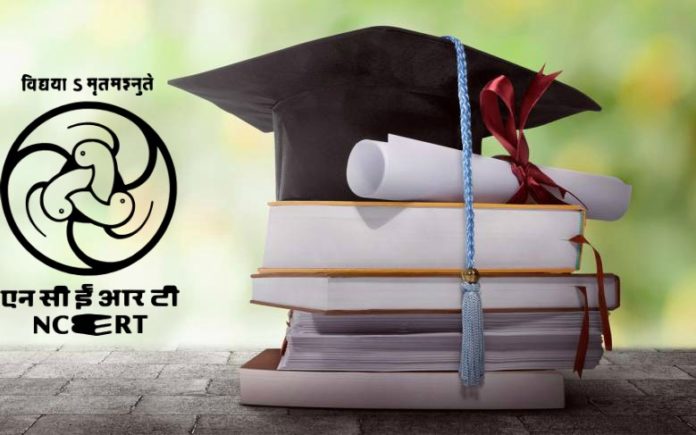NCERT Doctoral Fellowships 2018 – Official Notification
National Council of Educational Research and Training (NCERT) Doctoral Fellowships 2018 notitication has been released. Interested and eligible candidates can check out all of the details on the objectives, scope of scheme, application procedure, important dates and more below:
This call expires in :
The National Council of Educational Research and Training (NCERT) is an
autonomous organization set up by the Government of India to advise and assist the
Ministry of Human Resource Development at the center, and Education Departments
of States/Union Territories in formulation and implementation of their policies and
major programmes in the field of education, particularly for qualitative improvement of
school education. The major constituent units of the NCERT are: (1) National Institute
of Education (NIE), New Delhi, (2) Central Institute of Educational Technology (CIET),
New Delhi, (3) Pandit Sunderlal Sharma Central Institute of Vocational Education
(PSSCIVE), Bhopal, (4) Regional Institute of Education (RIE), Ajmer, (5) Regional
Institute of Education, Bhopal, (6) Regional Institute of Education, Bhubaneswar, (7)
Regional Institute of Education, Mysore, and (8) North-East Regional Institute of
Education (NERIE), Shillong. Among several activities, the NCERT and its constituent
units undertake, aid, promote and coordinate
education.
The NCERT has brought out National Curriculum Framework 2005 (NCF-2005),
which has enabled a fresh discourse and new ideas on education in India. With a
focus on the child, NCF-2005 stresses the need for a perspective on how children learn
and environments to enable this process within larger concerns of equality and justice
in a democratic society. The document further emphasizes the understanding of
curricular and pedagogic practices, and social and cultural factors that influence and
mediate these processes in diverse contexts. There is a need to develop a body of
knowledge that enhances our understanding of the concerns expressed in NCF-2005.
Towards this end, the NCERT intends to offer fellowships, named as NCERT Doctoral
Fellowships, for conducting research at the doctoral level.
Objectives of the Scheme:
(a) To provide opportunities to young scholars to research the field of education
from different disciplinary perspectives.
(b) To build the knowledge base of education in the contemporary context.
Scope of the Scheme:
The NCERT Doctoral Fellowships are intended to enable young scholars to
pursue doctoral research in education and other related disciplines. Doctoral Fellows
can pursue their work in a recognized university/research institution of their choice.
The NCERT encourages original thinking in conceptualization of the problem and use
of innovative methodology in conduct of the research related to school education.
Priority Areas:
Fellowship will be given for research pertaining to the following priority areas:
Teacher Educators’ Education: Quality of pre-service and in-service teacher
education programs, challenges and opportunities in teacher training, Review and
Revision of curriculum/syllabi, assessment process of pre-service training, possible
changes in practices teaching, models of teacher training, deterioration in training
process. Internship issues related to teacher education, qualitative improvement in
teachers and teacher educators, issues related to admission and recruitment of
teacher educators.
Education of the Disadvantaged: Disadvantages of different kinds because of
belonging to scheduled castes/scheduled tribes and backward castes, and minority
communities, and due to gender, disability, and living in difficult circumstances.
Classroom Processes and Practices: Multi-grade teaching, over-crowded classrooms,
medium of instruction, languages used in the class, teaching-learning process, teacher
concerns, evaluation practices, disciplinary techniques, and space and time
management.
Curricular Areas: Teaching of Science, Mathematics, Language, Social Sciences, Arts
and Crafts, Work and Vocational Education, Environmental Sciences, and Health and
Physical Education.
Education for Peace: Conflict and its resolution in different spheres, problem of
violence, respect for cultural diversity, values for living in harmony with people and
nature, child rights, and sustainable development.
Psycho-social Development of Children: Development of self, relationships and
social skills, understanding and cognitive skills, communications skills, leadership,
decision-making and copying with stress.
Any Burning Issue in School Education
This will be judged on the basis of concept note/synopsis submitted by the candidate
with their application. The candidate should clearly state how does the proposed
research relates to above priority areas.
Eligibility:
- Good Academic record with at least 60% marks at both Graduate and Post
Graduate Levels. - Candidates should not be more than 35 years of age as on the last date of
receipt of applications. - Candidates registered for PhD degree in a recognized university/ or working
toward their PhD registration are eligible to apply.
Other conditions:
- Four out of 10 fellowships are reserved for 4 Regional Institutes of Education
(RIEs) one each for Ajmer, Bhopal, Bhubaneswar and Mysore. However, if no
candidate from RIEs is found suitable, the fellowship will be offered to other
suitable candidates. - The fellowships will be limited to extremely deserving candidates only. If
suitable candidates are not available, Council may not select all 10 Fellows. - Candidate applying for Doctoral Fellowship should have either completed
predoctoral research methodology course or enrolled/selected for such course
for appropriate duration as approved by UGC. The fellowship will start after
completion of the course and confirmed registration with the University for
Ph.D. work. - Each Doctoral Fellow will be required to present a seminar at the end of each
semester. - The NCERT Doctoral Fellow will be required to contribute to the RIE teaching
programme, field research and/or the curriculum development and textbook
development programmes of NCERT for 30 days in a year. The Fellow will be
provided III AC fare for the travel, and accommodation in the RIE hostel. - The Doctoral Fellow will be under obligation to present public lecture on larger
issues of public interest relevant to his/her doctoral research work, if so
invited. The seminar may be held at RIEs or NCERT headquarter and the
fellows will be given the III AC fare for travel for the same. ` - The candidate will submit with their applications, the CV of the research
supervisor which should clearly indicate the research work done by them in the
last five years. NCERT reserves the right to advise the candidate to chose a new
research supervisor if needed. The candidate may select a supervisor/research
guide approved by NCERT. The fellowship of the last three months and
contingency of the third year will be released only after receipt of the thesis.
Selection Procedure:
The procedure for short listing of applicants will be designed by NCERT.
Shortlisted candidates will be required to appear for an interview, which may also
include presentation of the proposals. Candidates will be paid second (sleeper) class
train fare by the shortest route for attending the interview-cum-seminar.
Reservation of Seats:
The statutory provisions for reservation of seats will be applicable to the
candidates belonging to different categories.
Fellowship Amount:
NCERT Doctoral Fellows will receive a fellowship of Rs.23,000/- per month (for
Non-NET) and Rs.25,000/- per month (in case of NET qualified candidates) for a
maximum period of three years from the date of permanent Ph.D. registration and/or
date of selection in NCERT. They will also receive a contingency grant of Rs.10,000/-
per annum during this period. The fellowship will commence from the date of joining
by the candidate after furnishing the documents of permanent Ph.D. registration in
NCERT and will terminate at the end of three years from the date of joining or with the
submission of the doctoral thesis whichever is earlier.
Disbursement of Fellowship:
The NCERT will credit the monthly fellowship to the savings bank account of
the Fellow. For this, each Fellow will be required to submit a ‘Certificate of Attendance
and Satisfactory Work Performance’ to NCERT on a quarterly basis. Release of the
monthly fellowship from second quarter onwards will be subject to receipt of the said
certificate. Annual contingency grant to the extent of actual expenditure incurred but
not more than Rs.10,000/- per annum will be credited to the account of the Fellow
after receipt and scrutiny of the bills/vouchers submitted by the fellow duly signed
and countersigned by the supervisor and Head of the Department.
Monitoring of Work:
Doctoral Fellows will be required to submit six monthly progress reports duly
forwarded by their supervisors/Head of the Department and Research Advisors to
NCERT. A Committee of Experts will review the progress. Also a research colloquium
will be held annually where Fellows will present the progress of their research. If the
progress of the research is found unsatisfactory, NCERT reserves the right to
terminate the fellowship at any point of time.
Leave Rules:
Leave rules as prescribed in case of UGC Junior Research Fellowship will be
applicable. Further, NCERT Doctoral Fellows will not accept any other remunerative
assignment during the period of fellowship.
Publication of the Thesis:
After the award of Ph.D. degree, the Doctoral Fellows will be required to submit
a Hard bound copy of the thesis (along with a CD) to NCERT. NCERT will consider
publication of the completed research in an appropriate form. The Fellow can apply for
permission to publish his/her work elsewhere.
Application Procedure:
Application should be filled in the prescribed format available on the NCERT
website (www.ncert.nic.in). Completed application forms should be accompanied by a
concept paper of about 1500 words on the theme of the proposed research, which
should contain statements about (a) rationale and objectives of the study, (b)
conceptual framework, (c) proposed methodology, and (d) potential contribution of the
study. Attested copies of all mark sheets/certificates and proof of Ph.D. registration (if
already registered) should also be sent with the application at the following address:
Head
Division of Educational Research,
Room No.14, 3rd Floor, Zakir Husain Block,
National Council of Educational Research and Training,
Sri Aurobindo Marg,
New Delhi – 110 016
The last date of receiving completed application is one month from the
publication of the advertisement in the newspaper.
Last Date: 16th December 2018
View Notification Below
Editor’s Note: National Council of Educational Research and Training (NCERT) Doctoral Fellowships 2018, NCERT Doctoral Fellowships 2018, National Council of Educational Research and Training Doctoral Fellowships 2018. Check out the Biotecnika Times Newsletter and also check out the Podcast we have for free listen on SoundCloud.








































